This article is the fourth in a series exploring gender inequality worldwide.
WASHINGTON, D.C. -- Women worldwide in 2011 continued to rate their lives similarly to men. Across 147 countries and areas, 24% of women rate their lives well enough to be considered "thriving" -- a key measure of societal well-being. Women are also as likely as men are to be "struggling" (63%) and "suffering" (13%).
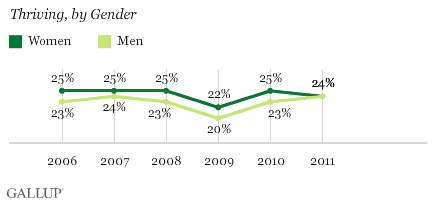
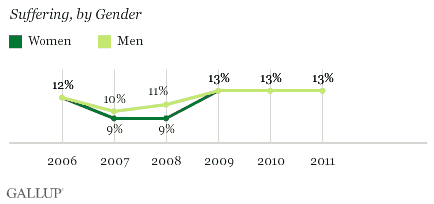
Gallup classifies respondents as thriving, struggling, or suffering according to how they rate their current and future lives on a ladder scale with steps numbered from 0 to 10, based on the Cantril Self-Anchoring Striving Scale, where 0 represents the worst possible life and 10 represents the best possible life. Respondents are classified as thriving if they rate their current lives a 7 or higher and their lives in five years an 8 or higher, and suffering if they rate both their current lives and their lives in five years a 4 or lower. The remainder are classified as struggling.
The parity in life evaluations among women and men in 2011 persists despite the gender inequality women face in the key areas of employment, personal safety, and physical well-being. While it is possible that women measure their lives by different standards than men do when rating their lives, the findings suggest that women exhibit a high level of subjective resilience and optimism despite the challenges they face.
Women's life evaluation ratings mirror men's on each of the components that make up Gallup's "thriving" measure. Women and men worldwide, on average, in 2011 each rated their current lives a 5.4 and their lives in five years a 6.6. These scores have also been remarkably close among women and men each year Gallup has tracked well-being worldwide.
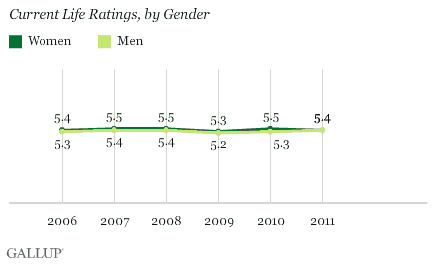
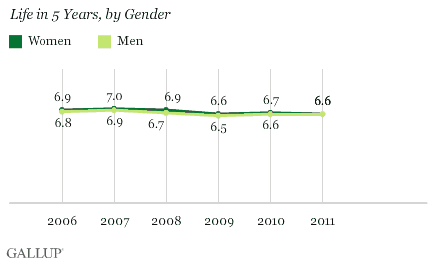
Thriving globally has not budged even one percentage point in recent years, except for a decline from 24% to 21% in 2009 after the global financial crisis. Suffering increased to 13% in 2009 from 9% in 2007 and hasn't changed since. This is true even though Gallup has documented sharp shifts in these life evaluation measures in countries facing political or economic turmoil, including Egypt, Tunisia, and Greece.
Gallup and other researchers such as Angus Deaton, Betsey Stevenson, and Justin Wolfers have found that people's evaluations of their lives are highly related to GDP per capita. This is true for both genders. Women and men rate their lives better, and to a similar degree, across GDP groups, as classified by the World Bank.
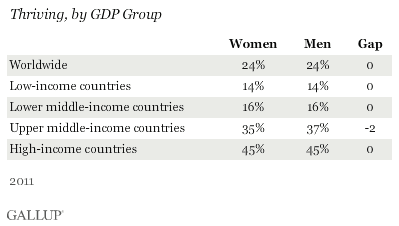
Americas Lead, Sub-Saharan Africa Lags
Women and men are the most likely to be thriving in the Americas, each rating their current lives a 6.8 and expecting them to be a 7.9 in the future. Women are least likely to be thriving in sub-Saharan Africa, but, here, optimism abounds as both genders give their future lives among the highest ratings worldwide. Women in the former Soviet Union trail their male counterparts the most, while women in the Middle East and North Africa are the most likely to rate their lives better than men do.
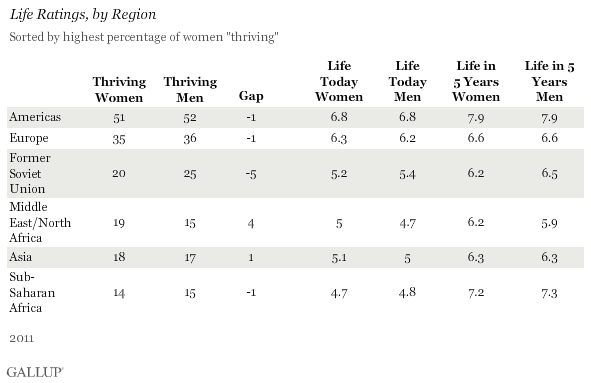
Women rate their lives differently than do men in only a few specific countries. Thriving among women trails thriving among men by double digits in two countries: Ukraine and Vietnam. The gaps in these countries reflect men rating their lives more positively in 2011 than in 2010, while women's life ratings remained steadier.
Conversely, thriving among women exceeds thriving among men by double digits in four countries: Qatar, Angola, South Korea, and Iran. In Qatar, Iran, and South Korea, women in recent years have consistently rated their lives more positively than men have. In Angola, both genders have grown more positive about their lives in recent years, but women more so than men.
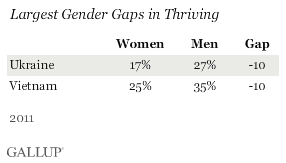
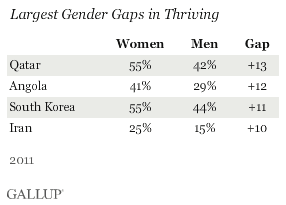
In South Korea, women have consistently been more likely than men to be thriving every year that Gallup has surveyed there, even as both genders have become more positive about their lives. South Korean women's positive life evaluations likely reflect their country's high employment rate among women -- even though women in South Korea on average earn 38% less than men, the largest gender pay gap in the world.
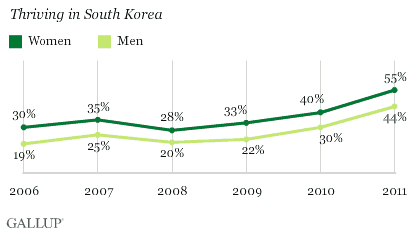
Denmark Does Best Overall, Afghanistan Worst
Women and men are most likely to be thriving in Denmark, at 78% and 70%, respectively, resulting in an eight-percentage-point gender gap in favor of women. Women in Afghanistan (2%) are among the least likely in the world to be thriving.
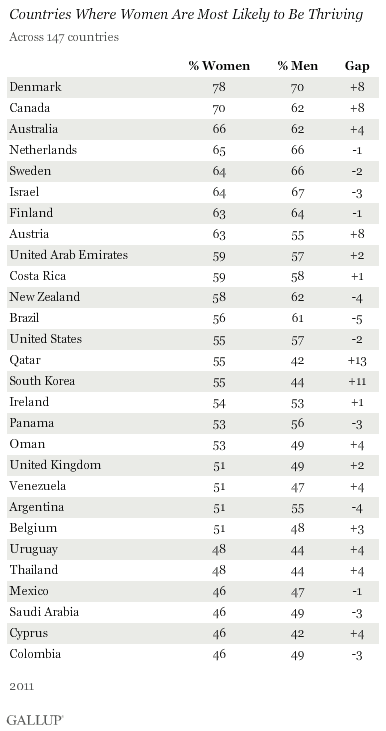
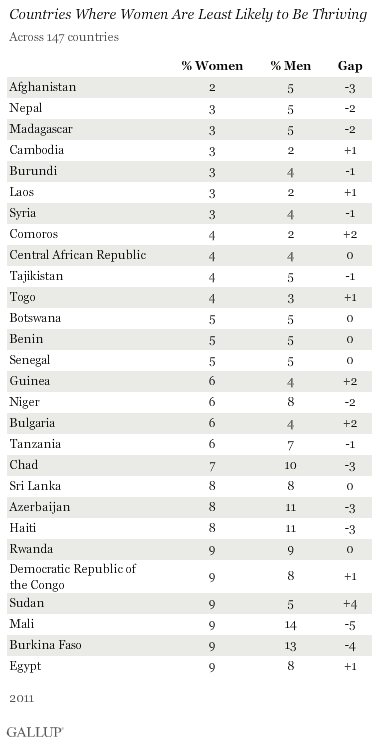
The low percentage of women who are thriving in Afghanistan marks a sharp decline from 15% in 2010. This is an exception to the pattern seen in most countries, where the trends in thriving among women and men tend to rise and fall together. The sharp decline in thriving in Afghanistan coincides with higher food prices and inflation and food shortages triggered by floods in 2010 in Pakistan, the country's chief food exporter.
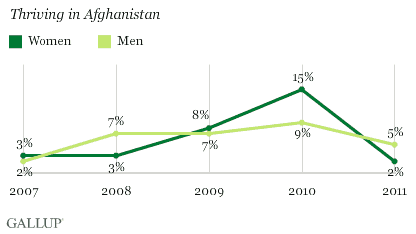
Other countries that saw double-digit declines in thriving among women in 2011 were El Salvador (-22), Bahrain (-15), Pakistan (-12), and Ireland (-10), and in each of these cases men also saw declines. In Zambia (-12), Guatemala (-10), and Paraguay (-10), women lost ground while men remained relatively steady. Ghana (+22), Uzbekistan (+22), South Korea (+15), and Thailand (+14) saw double-digit increases in thriving among women in 2011, accompanied by increases among men.
Implications
Gallup's global analysis reveals that women worldwide, and in most countries, in 2011 continued to rate their lives similarly to men. Women's parity with men is remarkable considering there are often gender gaps in the key areas of employment, personal safety, and physical well-being.
Leaders should be particularly concerned about women's well-being in the countries where women are less likely to be thriving overall, as well as where their well-being is deteriorating. It is important to measure and actively work to improve how women are doing overall on these metrics, in addition to how they are doing compared with men. Examining only the gender gap paints an incomplete picture.
As more women have more opportunitites to get good jobs, feel safe, and improve their physical well-being, they will be better positioned to contribute economically and socially to society, and positioned for even higher well-being. It is also clear that women take into account many factors when rating their lives -- much of which classic economic data alone cannot capture.For complete data sets or custom research from the more than 150 countries Gallup continually surveys, please contact SocialandEconomicAnalysis@gallup.com or call 202.715.3030.
Survey Methods
Results are based on telephone and face-to-face interviews with 191,317 adults, aged 15 and older, conducted during 2011 in 147 countries and areas. For results based on the total global sample, one can say with 95% confidence that the maximum margin of sampling error is less than ±1 percentage point. For results based on country-level samples, the margin of error ranges from a low of ±1.6 percentage points to a high of ±7.3 percentage points. The margin of error reflects the influence of data weighting. In addition to sampling error, question wording and practical difficulties in conducting surveys can introduce error or bias into the findings of public opinion polls.
For more complete methodology and specific survey dates, please review Gallup's Country Data Set details.


